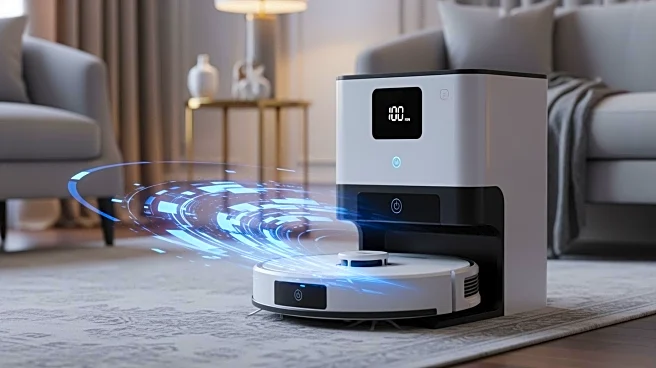What's Happening?
Harishankar Narayanan, a computer programmer and electronics enthusiast, discovered that his iLife A11 smart vacuum was transmitting data from his home to servers located across the globe. Narayanan, who is cautious about privacy, monitored the network
traffic of his smart vacuum and found it was sending logs and telemetry data without his consent. After attempting to stop the data transmission, the vacuum malfunctioned and eventually stopped working. Despite sending it for repairs, the vacuum continued to fail, leading Narayanan to investigate further. Upon reverse engineering the device, he found that it was using Google Cartographer to create a 3D map of his home, which was being sent back to the manufacturer. Additionally, he discovered a remote kill command had been issued to disable the device, raising concerns about the manufacturer's ability to control consumer devices remotely.
Why It's Important?
This incident highlights significant privacy and security concerns associated with smart home devices. As these devices become more prevalent, the potential for unauthorized data collection and remote control by manufacturers poses risks to consumer privacy. The ability of companies to disable devices remotely could lead to a loss of consumer trust and raises questions about the ethical use of technology. The broader implications for U.S. consumers include the need for stricter regulations and transparency in the operation of smart devices to protect privacy and prevent misuse. This case serves as a reminder of the hidden costs associated with smart technology, emphasizing the importance of informed consumer choices and potential regulatory oversight.
What's Next?
The revelation of smart vacuums transmitting data and being remotely controlled may prompt calls for increased regulation and oversight of smart home devices. Consumers and advocacy groups might push for legislation that ensures transparency in data collection practices and limits manufacturers' control over devices post-purchase. Additionally, manufacturers may face pressure to improve security measures and provide clearer disclosures about data usage. As awareness grows, consumers may become more cautious about integrating smart technology into their homes, potentially influencing market trends and product development in the tech industry.
Beyond the Headlines
The ethical implications of smart devices collecting and transmitting data without user consent are profound. This situation underscores the need for a balance between technological advancement and consumer rights. The potential for smart devices to be 'weaponized' against their owners raises questions about the accountability of tech companies and the protection of personal privacy. Long-term, this could lead to a cultural shift in how consumers view and interact with technology, prioritizing privacy and security over convenience.















